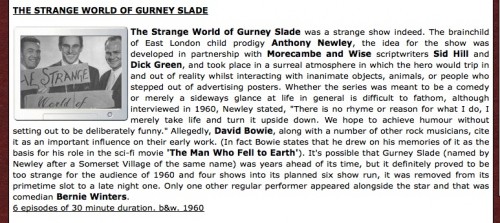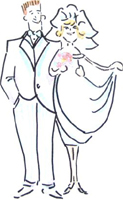Weird Names
The Strange World of Gurney Slade

Click on text for a version more readable.
To watch an episode of this bizarre cult show, start with Part 1 here.
Posted By: Paul - Mon Feb 28, 2011 -
Comments (4)
Category: Anthropomorphism, Television, Weird Names, Surrealism, 1960s
Weird Shorts – 4

That’s not to say that our massive consumption doesn’t have it’s upside, As Vangelis Kapatos of Manhattan discovered when he attempted suicide by jumping from his ninth floor flat, only to survive when his fall was broken by a pile of uncollected garbage. Mr. Kapatos’ timing, from his perspective, couldn’t have been worse, the unusually large garbage pile was due to collections being suspended because of snow. They were due to resume the day after his impromptu dumpster dive (Today Online).
Mind you, we’re not the only animals prone to excess. After finding the bodies of dozens of starlings near the city of Constanta in Romania, locals were concerned that the cause might be bird flu, instead post-mortems of the birds have revealed that they in fact died of alcohol poisoning, having ‘drunk’ themselves to death on the discarded leftovers of the local winemaking industry. A least they died happy (BBC News).
Better than dying happy, though, is living happy, and the secret of that, says the UK’s Office for National Statistics, is having a job. But it’s not the pay but the job security that counts, say the government statisticians, which ironically are facing staff cuts themselves due to the economic downturn. Other key happiness factors, according to the preliminary report, are good personal health and a decent family life. What will we do without these people (Telegraph)?
More in extended >>
Posted By: Dumbfounded - Thu Jan 13, 2011 -
Comments (4)
Category: Animals, Dinosaurs and Other Extinct Creatures, Armageddon and Apocalypses, Babies, Crime, Death, Human Marvels, Inebriation and Intoxicants, Religion, Sexuality, Weird Names, Body Fluids, Perfume and Cologne and Other Scents
Worst. Realty Name. Ever.

Visit the insane female realtor here.
Posted By: Paul - Mon Sep 13, 2010 -
Comments (4)
Category: Business, Real Estate, Weird Names
Read This Before You Get Married

Posted By: Nethie - Wed May 12, 2010 -
Comments (14)
Category: Family, Odd Names, Weird Names, Marriage, Weddings
Climax Shaft Clamping Collars
 Shaft clamping collars have many uses:
Shaft clamping collars have many uses:If you need some shaft clamping collars, consider buying them from Climax Metal Products. Their customers say, "You always have it in stock even on the odd sizes."
I'm not going to make a joke about male chastity belts, or anything like that. via
Posted By: Alex - Wed Dec 10, 2008 -
Comments (3)
Category: Business, Products, Weird Names
A Triumph of Nominative Determinism

But the obituary pages this week bring perhaps the supreme example. Please go read about the death of William Headline, news editor for CNN.
Posted By: Paul - Fri Oct 24, 2008 -
Comments (16)
Category: Weird Names, Obituaries
Radiation Cookery Book
Back in March I wrote an article for Smithsonian magazine about pseudo-scientific terms that have gone out of fashion. For instance, it used to be all the rage to affix "electro-" to everything, as in "electro-lumps" (one marketers inspired term for coal).A term I definitely could have included in my article is "radiation." Once upon a time it didn't have the negative connotations it does today. Witness the "Radiation Cookery Book" from 1934. It didn't actually use radiation for the cooking (except in so far as heat itself is a form of radiation). Instead "Radiation" was the name of the company that made the gas cooker for which the recipes were designed.

Posted By: Alex - Wed Jul 16, 2008 -
Comments (2)
Category: Fads, Food, Cookbooks, Science, Weird Names
eden ahbez and Nat King Cole and “Nature Boy”
I love the singing and musicianship and general personal integrity of Nat King Cole. Hearing him immediately brings me back to my childhood in the late 1950's, the height of Cole's popularity.Of course, like many popstars of the 1950's, Cole's star was eclipsed with the rise of rock 'n' roll, and the hippies, in the 1960's.
But curiously enough, Cole played a tiny self-defeating part in that very movement, with his song "Nature Boy."
The tale behind that song involves one of the first proto-hippies--a beatnik, I suppose--named eden ahbez.
 |
Ahbez is one of the twentieth century's bonafide wonderful weirdos, but pretty much forgotten these days.
Why not listen to "Nature Boy" to commemorate ahbez and King?
You might even want to pick up one of ahbez's CD's!
Posted By: Paul - Sat Jul 12, 2008 -
Comments (1)
Category: Art, Decades, 1950s, 1960s, Eccentrics, History, Historical Figure, Music, Weird Names
Foo Kin Chinese Food
My pal Pete Kaplan stumbled across this one. Who knew that up in Cooperstown, NY, they had such pronounced Liverpudlian accents?
Posted By: Paul - Wed Jul 09, 2008 -
Comments (7)
Category: Business, Advertising, Food, Restaurants, Weird Names

| Who We Are |
|---|
| Alex Boese Alex is the creator and curator of the Museum of Hoaxes. He's also the author of various weird, non-fiction, science-themed books such as Elephants on Acid and Psychedelic Apes. Paul Di Filippo Paul has been paid to put weird ideas into fictional form for over thirty years, in his career as a noted science fiction writer. He has recently begun blogging on many curious topics with three fellow writers at The Inferior 4+1. Contact Us |




